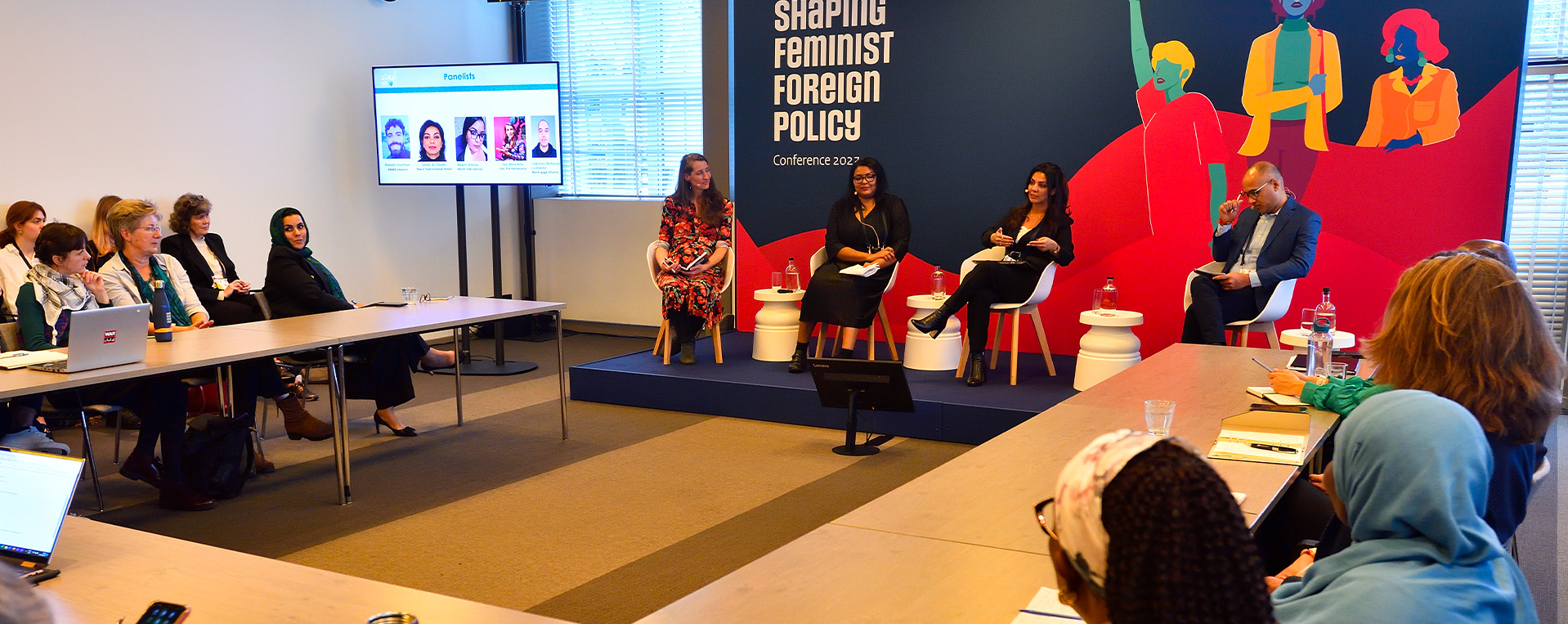During the Shaping Feminist Foreign Policy Conference, organised by the Dutch Ministry of Foreign Affairs, PAX led discussions on how Feminist Foreign Policy should aim to advance peace and security. We did this by being part of the conversations around militarised masculinities, in a session organised by ABAAD and by promoting and discussing our FFP Manifesto with 10 Actions to advance Peace and Security. Of course, the Dutch abstention on a UN vote calling for a ceasefire in Gaza made the focus on peace and security within FFP all the more pertinent. Addressing this, PAX released a statement calling for a ceasefire, an end to war crimes and no further militarisation.

The PAX market stand was a place where we exhibited our 10-point FFP Manifesto to Advance Peace and Security, which was developed in collaboration with over 80 leading practitioners and academics. The stand was a place to sign onto the FFP Manifesto and critically discuss FFP actions to advance peace and security.
Masculinities, Militarisation and Peacebuilding
Next to the market stand, Ilse Wermink, Gender Advisor at PAX, facilitated a session on Masculinities, Militarisation and Peacebuilding, organised by ABAAD. After the session was opened by Hassan Joumaa (ABAAD), a panel of experts consisting of Reem Abbas (WILPF), Linda Al Obahi (Peace Track Initiative) and Laxman Belbase (MenEngage) delved into the multiple and crucial connections between men, masculinities, conflict prevention, and peacebuilding, and what Feminist Foreign Policy can do better to engage with masculinities.

A militarised marketplace
In his opening remarks, Hassan Joumaa emphasized the importance of having this conversation in this space, especially with the increasing militarisation and impacts of armed conflicts around the world. Reem Abbas, as a Sudanese feminist activist, then spoke on how the political situation in Sudan has become a militarised marketplace and with that, is excluding women. She argues “a feminist foreign policy should ensure that the international community don’t support peace agreements that end up rewarding men with arms and instead, they should invest in supporting non-violent civil politics.”
Fostering alternative models of manhood
Linda Al Obahi, a Yemeni feminist activist, shed light on the experience of peacebuilding in Yemen, where the critical challenge is to “counter the influence of militarized masculinities, where men are conditioned to view violence as a demonstration of masculinity. Changing this perception and mobilizing men for feminist peace-building in Yemen means challenging these traditional notions and fostering alternative models of manhood that promote peace.”
Promote peace and non-violence
As the last person on the panel Laxman Belbase, FFP conference ambassador and Co-Director of the MenEngage Alliance spoke about the importance of male allies in feminist peace and noted that as male allies, they were brought in by the feminist activists and they continue to be guided by them. Belbase also stressed the need to have a feminist foreign policy that strives to promote peace and non-violence and not merely try to accommodate international humanitarian laws that promote minimum standards in conflict situations.

During the entire conference, the crimes against humanity in Palestine were not only a topic of conversation, but also lead to action with many attendees protesting the Dutch government’s position, in various ways throughout the two-day conference. Unfortunately there was no inclusive discussion space created, and PAX together with Wo=Men member organisations have invited the Ministers for follow up discussions to address this.




